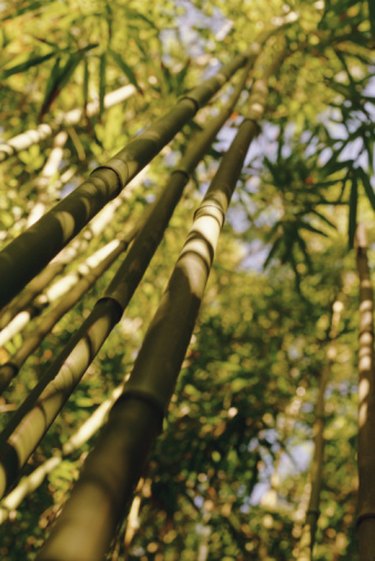
Mulch is used in landscapes around plants as a weed barrier and to help hold in moisture and nutrients, which is especially helpful in long periods of drought. Organic mulches are biodegradable, meaning that they decompose into the soil over time. Bamboo decomposes at a slower rate than many other shredded wood mulches, so it doesn't have to be replaced as often, saving you both time and money. Purchase it shredded or shred your own bamboo.
Step 1
Shred the bamboo stalks if you aren't purchasing preshredded, bagged bamboo mulch. You will need to use a large, powerful shredder because the stringy fibers of bamboo can wrap around the teeth of smaller machines and jam them up.
Video of the Day
Step 2
Arrange a 2- to 3-inch layer of shredded bamboo around your bamboo crop and flower beds. Don't push the mulch up against the plant stalks.
Step 3
Place a 2- to 6-inch mound of bamboo mulch around the base of trees to help hold in moisture; the depth of the mulch varies depending on the size of the tree and the desired results. Keep the mulch pulled back 1 to 2 inches from the tree trunks.
Step 4
Fill in puddles and wet areas of your yard with several inches of shredded bamboo mulch. The fibers of bamboo bind together to form a moisture barrier.
Step 5
Line walkways with several inches of bamboo mulch. This is a budget-friendly and time-saving alternative to paving stone pathways that can still look equally appealing in your landscape.
Step 6
Replenish the mulched areas with additional shredded bamboo as the old layers decompose.
Tip
You may need to turn or loosen the mulch periodically if the fibers seem to bind to tightly for water penetration.
Video of the Day